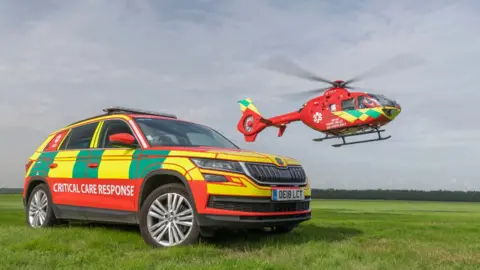Harefield Hospital offers advanced CPR to out-of-hospital patients
 Michael Molloy
Michael MolloyA London hospital is hoping to save more lives by offering out-of-hospital patients who have had a cardiac arrest an advanced form of resuscitation.
Harefield Hospital, in Hillingdon, already offers E-CPR, which involves pumping blood through an artificial lung machine, for some inpatients.
Thames Valley Air Ambulance crews will now also identify out-of-hospital patients who could use the service.
Doctors hope it will improve the chances of someone surviving.
E-CPR is a resuscitation method which sees a patient connected to a machine that pumps blood through an artificial lung outside the body when their own circulatory system is unable to function properly.
The service involves a patient receiving cardiopulmonary resuscitation (CPR) while hooked up to the machine, also known as an ECMO (extracorporeal membrane oxygenation).
The treatment is used for some people who suffer a cardiac arrest and do not respond to typical CPR while at the specialist heart and lung hospital.
Harefield Hospital will now also offer the service to out-of-hospital patients using the Thames Valley Air Ambulance in what it believes is a UK first.
Dr James Raitt, research lead at Thames Valley Air Ambulance, said: "Our critical care crews have been trained to quickly identify the patients who will benefit the most from E-CPR and then enact our procedures for ensuring the patient arrives as quickly as possible for the treatment."
Fewer than one in 10 people survive an out-of-hospital cardiac arrest, according to the National Institute for Health and Care Excellence.
Doctors hope that patients will be hooked up to the machine within 60 minutes from the cardiac arrest to give people the best chance of survival.
'Save more lives'
Dr Waqas Akhtar, registrar in cardiology and intensive care at Harefield Hospital and one of the developers of the service, said: "Delivering effective CPR, whether in hospital by medical professionals, or in the community by members of the public, is important to treat patients with cardiac arrests, however, survival rates tend to be low.
"An ECMO machine takes over the function of a patient's heart and lungs by taking deoxygenated blood out of the patient and inserting oxygenated blood back into them.
"This new service, combining CPR with placing patients on ECMO, has the potential to save more lives than we are able to do with CPR alone."
Dr Alex Rosenberg, intensive care consultant at Harefield Hospital, said there were currently a limited number of NHS centres in the UK which can deliver ECMO.
He said the scheme was currently a pilot project but added the hospital would work "with our partners across the NHS about the viability of the model being rolled out to other ECMO centres across the UK".

Follow BBC London on Facebook, Twitter and Instagram. Send your story ideas to [email protected]
